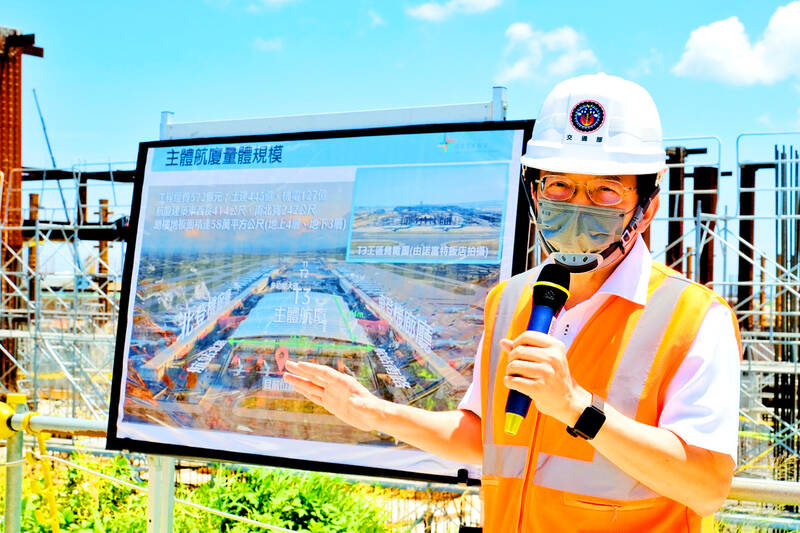Taoyuan International Airport Corp (TIAC) yesterday said that it is formulating a pricing scheme for airlines that want to use Taiwan Taoyuan International Airport’s Terminal 3 when it is completed in 2025.
The company made the announcement after nearly 100 members of the China Airlines Employees Union in the morning staged a protest in Terminal 2’s lobby for international arrivals.
The union members demanded that the company retain its usage scheme for Terminal 3 that it announced in 2018, which would give China Airlines and other airlines from the SkyTeam Alliance exclusive usage rights.

Photo: CNA
“We will plan how Terminal 3 will be used by first taking into account the interests and convenience of international air travelers,” the airport company said.
“We will also consider whether such a plan can help airliners operate more efficiently and contribute to the future development of the airport,” it said.
“We will invite Taiwan’s international flight carriers to study and discuss how the new terminal should be used. Meanwhile, we are formulating a pricing scheme for airlines that want to be stationed in Terminal 3 and will communicate with them once a scheme is finalized,” the company said.
A comprehensive review is needed to determine how the airport’s terminals would be used, as the COVID-19 pandemic has caused a dramatic change in the global civil aviation industry, from the members of three major airline alliances to the number of air passengers accessing the Taoyuan airport, the company said.
The government’s civil aviation policy also changed in the post-pandemic era to encourage airlines to develop a network of flight routes, it said.
“Terminal 3 is a major public construction project in which the government has invested nearly NT$100 billion [US$3.13 billion]. Its success is related to the overall competitiveness of the country,” the company said.
“We appreciate the suggestions and guidance that we have received so far, and will continue to listen to the opinions from all stakeholders. We also look forward to a rational discussion of issues and hope to build a consensus,” it said.

Taiwan is stepping up plans to create self-sufficient supply chains for combat drones and increase foreign orders from the US to counter China’s numerical superiority, a defense official said on Saturday. Commenting on condition of anonymity, the official said the nation’s armed forces are in agreement with US Admiral Samuel Paparo’s assessment that Taiwan’s military must be prepared to turn the nation’s waters into a “hellscape” for the Chinese People’s Liberation Army (PLA). Paparo, the commander of the US Indo-Pacific Command, reiterated the concept during a Congressional hearing in Washington on Wednesday. He first coined the term in a security conference last

Prosecutors today declined to say who was questioned regarding alleged forgery on petitions to recall Democratic Progressive Party (DPP) legislators, after Chinese-language media earlier reported that members of the Chinese Nationalist Party (KMT) Youth League were brought in for questioning. The Ministry of Justice Investigation Bureau confirmed that two people had been questioned, but did not disclose any further information about the ongoing investigation. KMT Youth League members Lee Hsiao-liang (李孝亮) and Liu Szu-yin (劉思吟) — who are leading the effort to recall DPP caucus chief executive Rosalia Wu (吳思瑤) and Legislator Wu Pei-yi (吳沛憶) — both posted on Facebook saying: “I

The Ministry of Economic Affairs has fined Taobao NT$1.2 million (US$36,912) for advertisements that exceed its approved business scope, requiring the Chinese e-commerce platform to make corrections in the first half of this year or its license may be revoked. Lawmakers have called for stricter enforcement of Chinese e-commerce platforms and measures to prevent China from laundering its goods through Taiwan in response to US President Donald Trump’s heavy tariffs on China. The Legislative Yuan’s Finance Committee met today to discuss policies to prevent China from dumping goods in Taiwan, inviting government agencies to report. Democratic Progressive Party Legislator Kuo Kuo-wen (郭國文) said

Sung Chien-liang (宋建樑), who led efforts to recall Democratic Progressive Party (DPP) Legislator Lee Kun-cheng (李坤城), was released on bail of NT$80,000 today amid outcry over his decision to wear a Nazi armband to questioning the night before. Sung arrived at the New Taipei District Prosecutors’ Office for questioning in a recall petition forgery case last night wearing a red armband bearing a swastika, carrying a copy of Adolf Hitler’s Mein Kampf and giving a Nazi salute. Sung left the building at 1:15am without the armband and covering the book with his coat. Lee said today that this is a serious